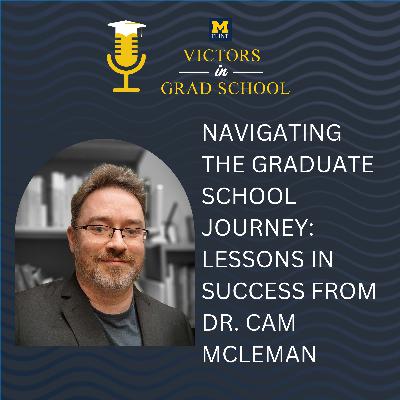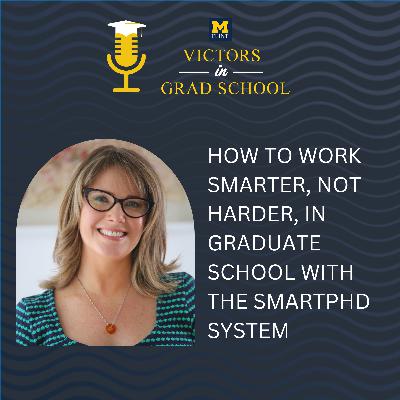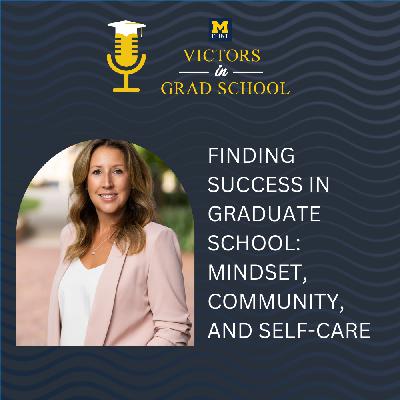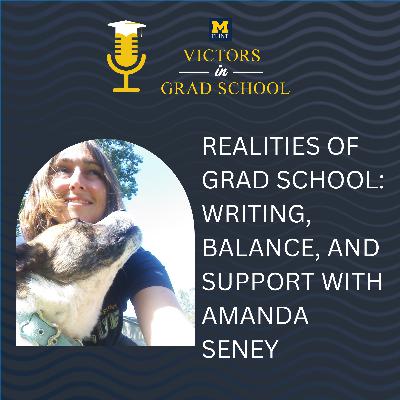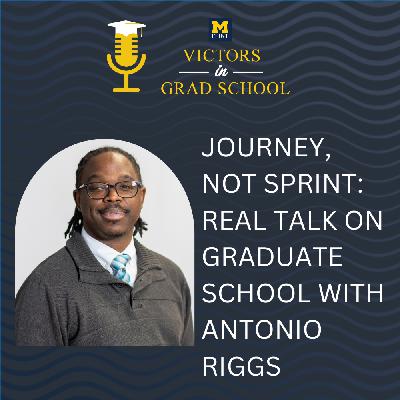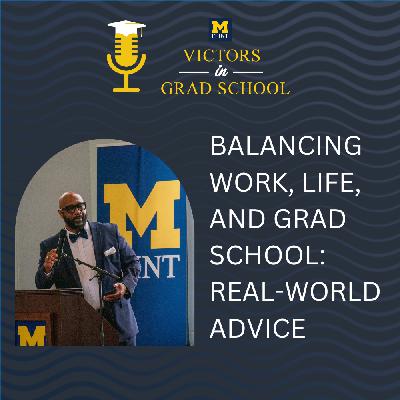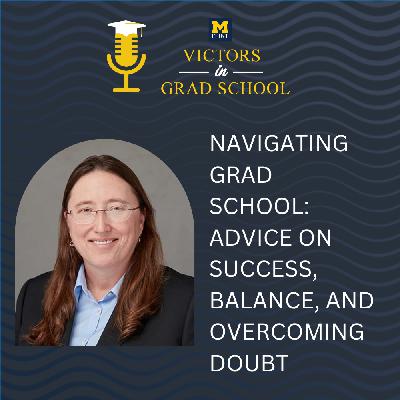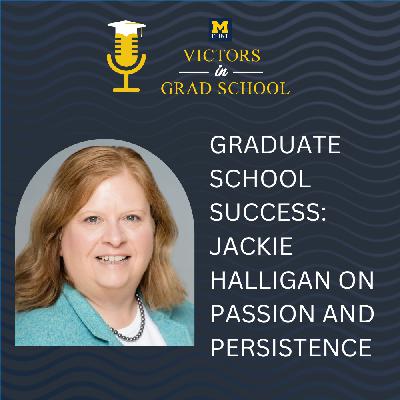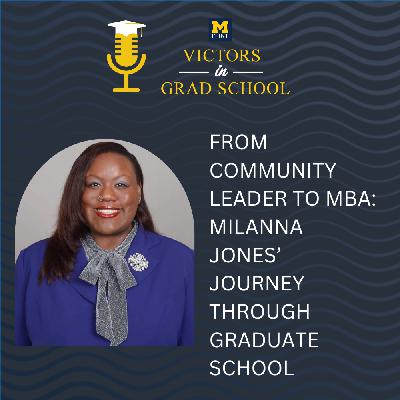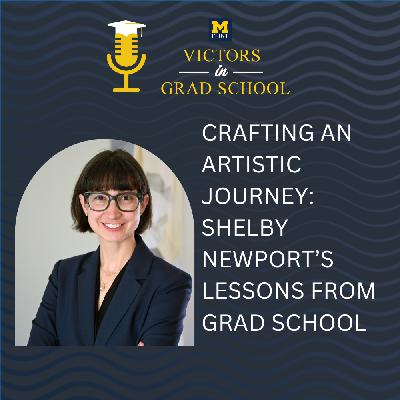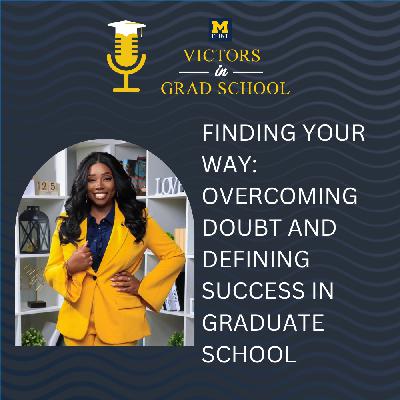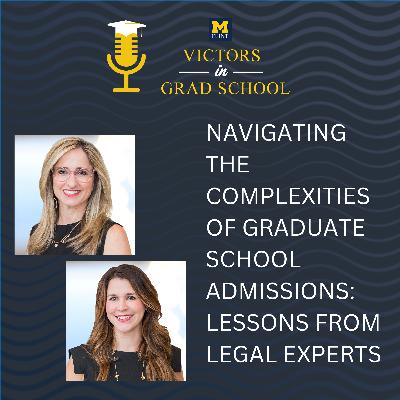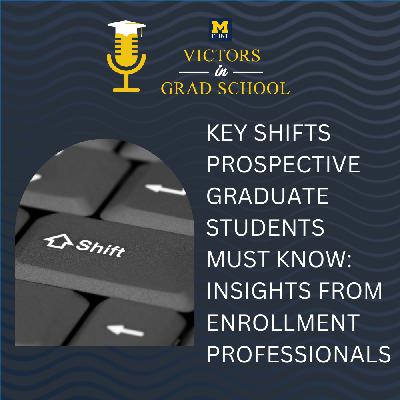Navigating the Graduate School Journey: Lessons in Success from Dr. Cam McLeman
Description
Considering graduate school or already deep in your studies? Navigating this journey can feel overwhelming—full of choices, challenges, and the constant pursuit of personal and professional growth. This week’s “Victors in Grad School” episode is a must-listen for anyone at any stage of that journey, as Dr. Christopher Lewis sits down with Dr. Cam McLeman, director of the Data Analytics program at University of Michigan-Flint, to share valuable insights that will resonate with students, alumni, and educators alike.
Dr. McLeman’s story is one many can relate to: a passionate undergraduate uncertain about career direction, he experimented with disciplines before returning to his true academic love—mathematics. His decision to pursue a PhD, driven by a thirst for deeper knowledge rather than a prescribed career path, will inspire those who view learning as a lifelong process. But his journey didn’t stop with earning that doctorate—transitioning into the realm of data analytics, Dr. McLeman demonstrates the power of adapting skills and embracing new opportunities as the landscape of higher education and industry evolves.
The conversation dives deep into practical wisdom for succeeding at the graduate level. Transitioning from undergraduate to graduate studies, Dr. McLeman notes, is much like moving from high school to college—you’re expected to take far more ownership of your pathway. The self-driven nature of graduate school requires not just academic diligence but also proactive organization, advocacy, and a willingness to push beyond comfort zones. Dr. McLeman highlights the importance of building connections: with faculty, with industry, and especially with peers who are further along the journey. “Don’t struggle in silence,” he urges, pointing to the wealth of support services campuses offer—from academic assistance to mental health and disability support. Success often hinges on reaching out and taking advantage of these resources before issues become overwhelming.
Perhaps the most compelling theme fro
TRANSCRIPT
Dr. Christopher Lewis [00:00:01 ]:
Welcome to Victors in Grad School, where we have conversations with students, alumni, and experts about what it takes to find success in graduate school.
Dr. Christopher Lewis [00:00:11 ]:
Welcome back to Victors in Grad School. I'm your host, Dr. Christopher Lewis, Director of Graduate programs at the University of Michigan, Flint. Really excited that you're back again this week, every week. I love being able to bring you on this journey because it is a journey. You have made a choice. You've made a choice that either you're looking at graduate school, maybe you've applied to graduate school, maybe you got accepted to graduate school. No matter where you are, whether you're just applying, you're in graduate school or beyond, this is a journey.
Dr. Christopher Lewis [00:00:38 ]:
And you have definite things that you can learn to be able to prepare yourself not only to make the transition into graduate school, but things that you can do to be able to be even more successful as you go through that entire graduate school process. And that's why this show exists every week. I love being able to bring you different people with different experiences that can help you to be able to pick up some tools for your toolbox, to be able to help you to figure out some things that you might even be able to do right today. Or as you go further on, to help you in this journey. Today we got another great guest. Dr. Cam McLeman is here. And Cam is the director of our data analytics program here at the University of Michigan, Flint.
Dr. Christopher Lewis [00:01:25 ]:
And he had his own graduate school journey that we're gonna be talking about today. Also works with graduate students, so he definitely has some perspectives on what it's like to work with the graduate students and what he's seen with them. So I'm really excited to have him here, and I am really looking forward to having this conversation today. Cam, thanks so much for being here today.
Dr. Cam McLeman [00:01:44 ]:
Thank you very much for having me, Chris. I appreciate it.
Dr. Christopher Lewis [00:01:46 ]:
It is my pleasure. I am really excited to be able to talk to you today, to be able to delve a little bit deeper into your own journey and see what we can learn along the way. And I know you did your undergrad work at Harvey Mudd College and got a Bachelor of Science in Mathematics. And at some point during that time during your undergraduate work, you made a decision. You made a decision that you wanted to continue on with your education. Bring me back to that point and talk to me about kind of what you were thinking and what made you decide that you wanted to go on to graduate school.
Dr. Cam McLeman [00:02:15 ]:
Yeah, so I came into undergrad pretty confident that I wanted to do mathematics. In some capacity. I also had a passing interest in computer science and physics and engineering, but I knew that math had to be part of it. And as I travers my undergraduate degree, I dabbled in all of those things. I picked up a second major in computer science, and then I dropped that, decided it wasn't for me, and I picked up a second major in physics, and I dropped that and decided it wasn't for me. And every time I just came back to math, and that's what I found my passion in. And by the end of my undergraduate degree, it wasn't so much that I was chasing a specific career, it was just that I knew I was not done learning math. I couldn't choose not to keep going.
Dr. Cam McLeman [00:02:57 ]:
So. So grad school was in some sense just the natural continuation of my learning process at that moment.
Dr. Christopher Lewis [00:03:04 ]:
So as you made that decision that you were going to keep learning, you wanted to keep going and continue your education, I'm sure you did some exploration, you did some research, you tried to figure out for yourself where was that next step. And ultimately, I know you made the choice to go to the University of Arizona to get a PhD in mathematics. Talk to me about that journey for yourself and what made you decide first, a PhD in mathematics. But also, what did you go through? What were some of the things that you were looking for? What made you ultimately end up choosing the University of Arizona over the many other PhD programs that are out there across the United States and beyond?
Dr. Cam McLeman [00:03:44 ]:
Yeah, that's a great question. And to be fair, it was not an easy discussion. The choices when you're graduating from an undergraduate institution, especially, I think in a STEM field, are pretty overwhelming. There are industry options and commercial options to consider. Those were not my particular, you know, appeal. That was wasn't what I was interested in. I was interested in doing more academics. So then you have the question of do you go for a Master's degree or a PhD degree if you want to keep going, and in mathematics, that the choice is a little bit different than in some fields in that a master's degree is something you would pick if you knew what career you wanted to go into, and it had a master's degree requirement to it.
Dr. Cam McLeman [00:04:25 ]:
Whereas a PhD degree is the academic degree. If you want to go for the full doctorate, knowing that along the way, you essentially pick up a master's degree. So for me, the choice was clear because I knew that if I needed to bail out at some point along the way, decided that the PhD wasn't for me, then most PhD programs give you that that exit ramp to exit with just a Master's degree just is not meant as pejoratively there, just earlier than the PhD and then sort of every stage in your academic career from there on, you are constrained by availability. So I probably applied to a dozen grad schools for my PhD program. That's out of a choice of several hundred. So this was finding the programs that appealed to me both geographically and in terms of what expertise their faculty had. And cost was a factor, the likelihood that they would be able to subsidize part of my education. And in the end, the University of Arizona offered the best total package there.
Dr. Cam McLeman [00:05:33 ]:
I had never been to Arizona. I did not know that it would reach 110 degrees some summers. That was a climate based struggle for me during my time there. But in terms of the quality of the faculty and the aid package they were able to offer me, that just rose above the rest.
Dr. Christopher Lewis [00:05:52 ]:
Now, as you make that transition and you go to graduate school, there is definitely a transition, because the way that you're taught as an undergraduate student is not going to be the same way that you're going to be taught as a graduate student. There's different expectations not only of your faculty, but also pressure that you put on yourself. Expectations that you have on yourself for the ultimate goal that you're working, working to attain. You found success, you ended up getting that PhD, getting that graduate degree. As you think back to that transition for yourself, what did you have to do to set yourself up for success as you transitioned into graduate school? And what did you have to do to maintain that success throughout the entire graduate school journey?
Dr. Cam McLeman [00:06:37 ]:
That's a great question. Let me start by a preliminary story, which is that in my role right now, I deal with a lot of the transition from high school students to undergraduate students, students telling them what to expect in their first yea

